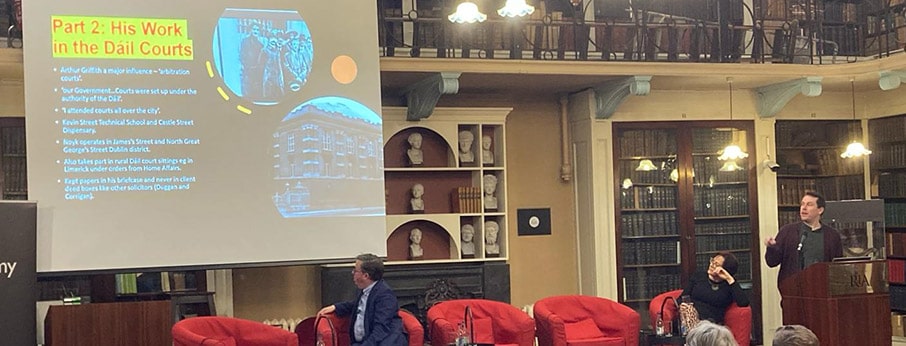 Dr Barry Whelan of the Law Society at the RIA
Dr Barry Whelan of the Law Society at the RIA
‘Women fared better in Dáil Courts’
The Dáil Courts, the alternative legal system set up under the First Dáil, was more progressive in relation to women than the system that followed with the establishment of the new State, a recent conference has heard.
Held at the Royal Irish Academy (RIA) on 27 March, the event, entitled “‘Revolutionary’ Law and Social Realities: A Centenary Retrospective”, focused on the Dáil Courts and covered the broader political, social, and personal contexts of the period.
Also known as the Republican courts, the Dáil Courts were an important component of the counter-State established in Ireland following the success of Sinn Féin in the 1918 General Election. These courts were in operation from 1920 to 1924 and were most active during the War of Independence.
Mirroring the tiered British system, they consisted of a supreme court, circuit courts, a district court in every parliamentary constituency, and a local court in every Roman Catholic parish.
In 1924 the Dáil Courts were subsumed into the current legal system.
Women judges
Speaking at the event at the RIA, Dr Heather Laird (English lecturer at University College Cork, small picture), explained that Dáil Court proceedings were often held in halls, outhouses, and rooms above shops.
“Legal training was required for the upper rungs of the court system, but not the lower. Women availed of the opportunity to be parish-court judges. Among these were Kathleen Clarke, Maud Gonne MacBride, and Hanna Sheehy-Skeffington,” she said.
“As these courts were the most active tier of the Dáil Courts system, such women played a key role in what could be considered the legal front of the War of Independence.
“This alternative legal system was innovative in its use of female judges. But it would take over 40 years for the legal system in independent Ireland to come close to matching the level of involvement of women in the Dáil Courts.”
New archival research
At the conference, John Biggins BL (UCD and Maynooth University) presented preliminary findings from his new archival research into the Dáil Courts.
Since last autumn, he has been conducting a qualitative analysis of mostly random case files held from the Dáil Courts Winding-Up Commission.
“My research confirms that there were a number of female judges on official lists. Interestingly, judicial-separation cases have come up where the Dáil Courts granted mensa et thoro [withdrawal from bed and board]. This was not divorce in the full sense, but authorised separation, where the couple could make an arrangement to live apart,” he said.
“Actions for seduction also appear in my sample. These covered situations where women were taken advantage of, and the mother or father sought damages for that. Most women were successful in these actions. It was antiquated but, in a way, points towards progressivism in the court system and gives pause for thought.”
Single-mother case
Laird highlighted how former Dáil Court judge James Creed Meredith alluded to another interesting aspect of women’s relationship with these courts in an article published in 1940 (in the Journal of the Statistical and Social Inquiry Society of Ireland).
Meredith had held the position of King’s Counsel under the official legal system before transferring his loyalties to the Dáil Courts and later being appointed President of the Irish Republic’s Supreme Court. He was one of the strongest exponents of the incorporation of the Brehon laws into the Dáil Courts system.
“In the article, Meredith recalled that he had presided over a case in 1920 involving a single mother seeking monetary support from the father of her child. Giving his judgment in accordance with what he deemed to be the spirit of the Brehon laws, he awarded the woman a sum of money in compensation for the expenses she had accrued in looking after the child,” said Laird.
“The contribution of women during the War of Independence in multitudinous ways – including in the Dáil Courts and the elimination of gender roles – had no resonance in the new State.”
Dr Barry Whelan of the Law Society was among the speakers at the RIA event. His presentation was on Lithuanian-born solicitor Michael Noyk, who was legal advisor to Michael Collins during the War of Independence.
Sorcha Corcoran
Sorcha Corcoran is a freelance journalist for the Law Society.